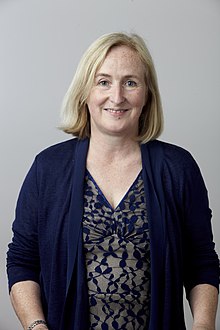Dame Amanda Fisher | |
|---|---|
 Fisher in 2016 | |
| Born | Amanda Gay Fisher |
| Alma mater | University of Birmingham[6] |
| Awards |
|
| Scientific career | |
| Institutions |
|
| Thesis | Surface antigens expressed during myelopoiesis (1984) |
| Notable students | Kat Arney (postdoc)[4][5] |
| Website | imperial |
Dame Amanda Gay Fisher is a British cell biologist and Director of the Medical Research Council (MRC) London Institute of Medical Sciences[3] at the Hammersmith Hospital campus of Imperial College London, where she is also a Professor leading the Institute of Clinical Sciences.[7][8][9][10][11][12][13] She has made contributions to multiple areas of cell biology, including determining the function of several genes in HIV and describing the importance of a gene's location within the cell nucleus.
As a postdoctoral researcher, she produced the first functional copies of HIV, providing researchers with access to enough biologically active material to study the function of the virus's genes. She later became interested in epigenetics and nuclear reprogramming, particularly in white blood cells known as lymphocytes and embryonic stem cells. As of 2016[update] her research focuses on how gene expression patterns are inherited when cells divide, using lymphocytes as a model system.[14]
- ^ Anon (2001). "EMBO Member: Amanda Fisher". people.embo.org. Heidelberg: European Molecular Biology Organization. Archived from the original on 29 November 2016. Retrieved 28 November 2016.
- ^ Amanda Fisher's ORCID 0000-0003-3010-3644
- ^ a b Anon (2016). "MRC London Institute of Medical Sciences". csc.mrc.ac.uk. Archived from the original on 17 November 2016. Retrieved 25 November 2016.
- ^ Arney, Katharine L.; Fisher, Amanda G. (2004). "Epigenetic aspects of differentiation". Journal of Cell Science. 117 (19): 4355–4363. doi:10.1242/jcs.01390. PMID 15331660. S2CID 24376600.
- ^ Arney, Kat (2010). "Ada Lovelace day – Professor Amanda Fisher". katarney.wordpress.com. Archived from the original on 16 November 2013.
- ^ Fisher, A. G.; Brown, G (1980). "A rapid method for determining whether monoclonal antibodies react with the same or different antigens on the cell surface". Journal of Immunological Methods. 39 (4): 377–85. doi:10.1016/0022-1759(80)90238-0. PMID 7007517.
- ^ Amanda Fisher publications indexed by the Scopus bibliographic database. (subscription required)
- ^ Anon (2003). "Professor Amanda Fisher FRS FMedSci". acmedsci.ac.uk. London: Academy of Medical Sciences, United Kingdom. Archived from the original on 2 August 2016.
- ^ Azuara, V; Perry, P; Sauer, S; Spivakov, M; Jørgensen, H. F.; John, R. M.; Gouti, M; Casanova, M; Warnes, G; Merkenschlager, M; Fisher, A. G. (2006). "Chromatin signatures of pluripotent cell lines". Nature Cell Biology. 8 (5): 532–8. doi:10.1038/ncb1403. PMID 16570078. S2CID 52868579.
- ^ Brown, K. E.; Guest, S. S.; Smale, S. T.; Hahm, K.; Merkenschlager, M.; Fisher, A. G. (1997). "Association of Transcriptionally Silent Genes with Ikaros Complexes at Centromeric Heterochromatin". Cell. 91 (6): 845–54. doi:10.1016/S0092-8674(00)80472-9. PMID 9413993. S2CID 18492912.
- ^ Kosak, S. T.; Skok, J. A.; Medina, K. L.; Riblet, R; Le Beau, M. M.; Fisher, A. G.; Singh, H (2002). "Subnuclear Compartmentalization of Immunoglobulin Loci During Lymphocyte Development". Science. 296 (5565). American Association for the Advancement of Science: 158–62. Bibcode:2002Sci...296..158K. doi:10.1126/science.1068768. PMID 11935030. S2CID 42222907.
- ^ Anon (2002). "Amanda Fisher receives EMBO Gold Medal". scienceblog.com. Retrieved 25 May 2014.
- ^ Epigenetic reprogramming by Amanda Fisher on Vimeo
- ^ Anon (2014). "Professor Amanda Fisher FMedSci FRS". London: royalsociety.org. Archived from the original on 4 March 2016. One or more of the preceding sentences incorporates text from the royalsociety.org website where:
"All text published under the heading 'Biography' on Fellow profile pages is available under Creative Commons Attribution 4.0 International License." --"Royal Society Terms, conditions and policies". Archived from the original on 25 September 2015. Retrieved 9 March 2016.
{{cite web}}: CS1 maint: bot: original URL status unknown (link)